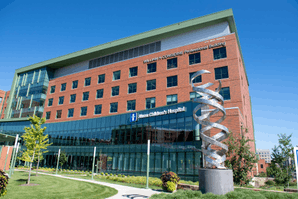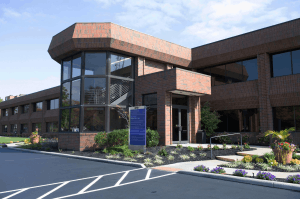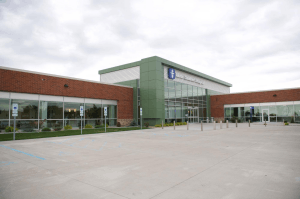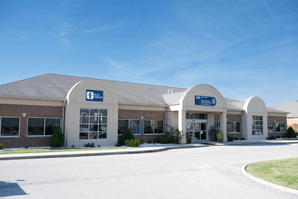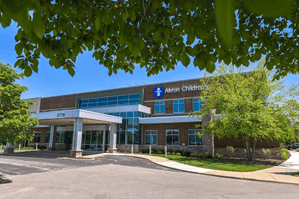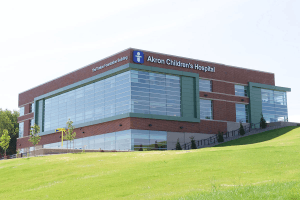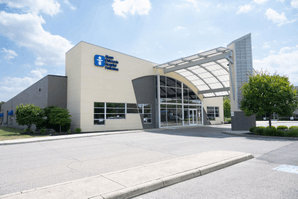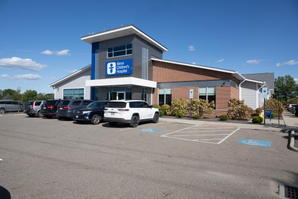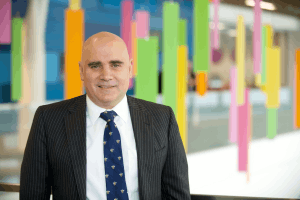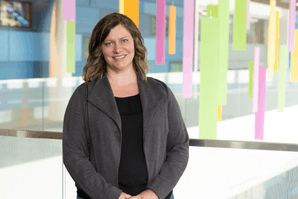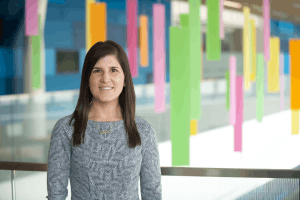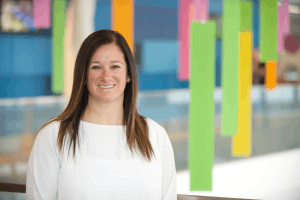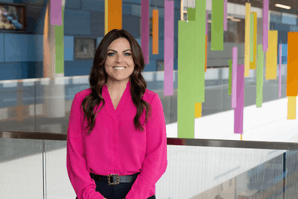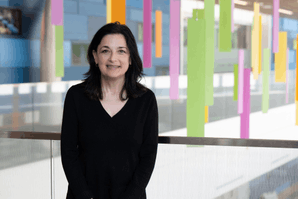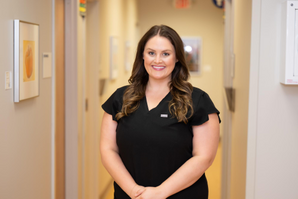Pediatric Gastroenterology

We combine our expertise in pediatric gastrointestinal diseases with advanced diagnostics and therapies to provide the highest quality medical care to infants, children and teens with digestive problems. We focus on concerns unique to pediatric patients, including growth, physical and emotional development, and age-related social issues.
Learn more...About Gastroenterology
We have a team of board-certified pediatric gastroenterologists, certified pediatric nurse practitioners, pediatric nurses, registered dietitians and social workers. Our program is ranked among the best by U.S. News & World Report.
Our team is experienced in diagnosing and treating all types of gastrointestinal, liver, and pancreas disorders such as celiac disease, gastroesophageal reflux, inflammatory bowel disease, hepatitis, and pancreatitis.
We also collaborate with specialists from allergy and immunology to diagnose and treat eosinophilic esophagitis, a complex condition that causes digestive problems but is closely associated with allergies, including food allergies.
Our specialists provide such services as:
- Anorectal manometry
- Antroduodenal manometry
- Capsule endoscopy (PillCam)
- Colonoscopy
- Colonic manometry
- EndoFLIP®
- Esophageal manometry
- Flexsigmoidoscopy
- Gastric stimulation
- Hydrogen/methane breath testing
- IB-STIM
- Pelvic Floor Biofeedback
- pH impedance testing
- Upper endoscopy
Our center is also part of ImproveCareNow (ICN), an international, multicenter network with the goal of transforming care and improving outcomes for children and adolescents with inflammatory bowel disease (IBD). This partnership provides access to the best evidence, and tools for helping patients with IBD get better faster and stay well longer.®
Gastroenterology, Akron
Akron Children's Pediatric Gastroenterology, AkronConsidine Professional Building
215 West Bowery Street
Level 6
Akron, Ohio 44308
Map & directions
More about this location...
Hours
Appointments: 330-543-2778
Gastroenterology, Beachwood
Akron Children's Pediatric Gastroenterology, BeachwoodAkron Children's Health Center, Beachwood
3733 Park East Drive
Suite 230
Beachwood, Ohio 44122
Map & directions
More about this location...
Hours
Monday : 8 a.m. - 5 p.m.
Tuesday : 8 a.m. - 5 p.m.
Wednesday : 8 a.m. - 5 p.m.
Thursday : 8 a.m. - 5 p.m.
Friday : 8 a.m. - 5 p.m.
Hours vary by provider and location. Please schedule an appointment online.
Appointments: 330-543-2778
Gastroenterology, Boardman
Akron Children's Pediatric Gastroenterology, BoardmanLeonard J. Fisher Family Building
6505 Market Street, Building A
Suite A2100
Boardman, Ohio 44512
Map & directions
More about this location...
Hours
Appointments: 330-543-2778
Gastroenterology, Boston Heights
Akron Children's Pediatric Gastroenterology, Boston HeightsAkron Children's Health Center, Boston Heights
328 East Hines Hill Road
First floor - 1200g
Boston Heights, Ohio 44236
Map & directions
More about this location...
Hours
Appointments: 330-543-2778
Gastroenterology, Mansfield
Akron Children's Pediatric Gastroenterology, MansfieldAkron Children's Health Center, Mansfield
1029 South Trimble Road
Mansfield, Ohio 44906
Map & directions
More about this location...
Hours
Appointments: 330-543-2778
Department: 419-521-2900
Gastroenterology, Marietta
Akron Children's Pediatric Gastroenterology, MariettaMemorial Health System
Wayne Street Medical Campus
320 East 8th St., Suite 140
Marietta, Ohio 45750
Map & directions
More about this location...
Hours
Appointments: 330-543-2778
Gastroenterology, Medina
Akron Children's Pediatric Gastroenterology, MedinaAkron Children's Health Center, Medina
3778 Medina Road
Medina, Ohio 44256
Map & directions
More about this location...
Hours
Appointments: 330-543-2778
Gastroenterology, North Canton
Akron Children's Pediatric Gastroenterology, North CantonAkron Children's Health Center, North Canton
6076 Whipple Avenue Northwest
North Canton, Ohio 44720
Map & directions
More about this location...
Hours
Appointments: 330-543-2778
Gastroenterology, Warren
Akron Children's Pediatric Gastroenterology, Warren5000 East Market Street
Suite 29
Warren, Ohio 44484
Map & directions
More about this location...
Hours
Appointments: 330-543-2778
Department: 330-856-8000
Gastroenterology, Wooster
Akron Children's Pediatric Gastroenterology, WoosterAkron Children's Health Center, Wooster
3807 Friendsville Road
Wooster, Ohio 44691
Map & directions
More about this location...
Hours
Appointments: 330-543-2778
Reinaldo Garcia-Naveiro, MD
Director, Pediatric Gastroenterology; Pediatric Gastroenterologist
Christine Carter-Kent, MD
Interim Medical Director, Healthy Active Living Program, Pediatric Gastroenterologist
Christine Pasquarella, MD
Pediatric Gastroenterologist; Medical Director, Infusion Center
Kevin Watson, MD, FAAP
Pediatric Gastroenterologist; Assistant Director, Clinical Informatics, Specialty Systems
- Inflammatory Bowel Disease Binder
- IB-Stim
- For parents: Celiac Disease
- For parents: Constipation
- For parents: Crohn's Disease
- For teens: Digestive System
- For parents: Eosinophilic Esophagitis (EoE)
- For parents: Failure to Thrive
- For parents: Functional Abdominal Pain
- For teens: Gastroesophageal Reflux Disease (GERD)
- For parents: Gastroesophageal Reflux (GER) in Kids and Teens
- For parents: Inflammatory Bowel Disease (IBD)
- For kids: Irritable Bowel Syndrome
- For parents: Lactose Intolerance
- For parents: Liver Transplant
- For parents: Pancreatitis
- For parents: Peptic Ulcers
- For parents: Short Bowel Syndrome
- For parents: Soiling (Encopresis)
- For teens: Stomachaches
- For parents: Ulcerative Colitis
Open Clinical Studies
Safety and Efficacy of Nexium in Pediatric Patients with Erosive Esophagitis
The purpose of this study is to look at the use of Nexium in helping to heal Erosive Esophagitis (EE), which is irritation in the pipe that carries food from your mouth to your stomach. This study will look at children aged 1-11 years old.
More about this studyIBD ImproveCareNow Registry - working to improve the care and health of children with inflammatory bowel disease
ImproveCareNow is a network of thousands of doctors, health care professionals and patients who work together to improve the care and health of children with inflammatory bowel disease.
Research participants allow their healthcare providers to submit information about their health and medical status, tests, treatments and treatment response as well as information about daily experience with IBD and overall well-being. Beyond gender, age and zip code, the patient information will be non-identifiable.
More about this study
What families are saying…
“We were devasted when another GI provider told us our son needed a feeding tube. After 7 months of treatment and no improvement, we found Dr. Shivani Gupta at Akron Children’s. We got in to see her right away, and she was remarkable! She familiarized herself with our son’s medical history, thoroughly reviewed his symptoms, gave us her undivided attention and addressed our concerns. She changed his routine, saving him from a very serious and unnecessary procedure. We couldn’t have asked for a more compassionate, kind, attentive and knowledgeable provider. She improved our son’s quality of life.”
— Roy's Mom & Dad
“Dr Pascarella is AMAZING! I have had parents come to me and ask how we got answers to my sons bowel issues to get diagnosed with the Hirschsprungs Disease and I send them to her! She is our lifesaver! And we will FOREVER be thankful for a doctor who never gave up until we all had answers!!!!!!!”
— Anonymous
Programs and Clinics
Conditions and Treatments:
Achalasia, abdominal pain, biliary atresia, celiac disease, Crohn’s disease, chronic diarrhea, constipation/encopresis, diverticulitis, dysphasia, esophageal reflux, eosinophilic esophagitis, failure to thrive, feeding difficulties, feeding tubes maintenance and support (NG tube, G tube, ND tube, NJ tube, GJ tube, J tube), formula intolerance, fructose intolerance, gastroesophageal reflux disease (GERD), hepatitis, Hirschsprung disease, indeterminate colitis, inflammatory bowel disease (IBD), irritable bowel syndrome (IBS), lactose intolerance, liver diseases, pancreatitis, short bowel syndrome, small intestinal bacterial overgrowth (SIBO), stomach ulcers, sucrose intolerance, superior mesenteric artery syndrome, ulcerative colitis
Upcoming Events
Related Stories
By using this site, you consent to our use of cookies. To learn more, read our privacy policy.













